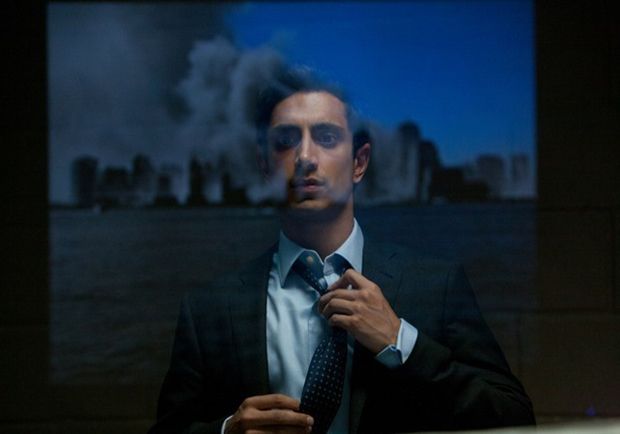Almost every shot in 42, the biopic of Jackie Robinson (the first African-American baseball player in the major leagues) feels like something out of a dream. Everything is soft-lit and gentle, no quick cuts or jarring effects. Each scene ends exactly when writer/director Brian Helgeland knows the scene has achieved its purpose.
And every scene in 42 has a clear purpose. Whether it's to show the baseball great (played by Chadwick Boseman) being a good father and husband, or to show the moral failure of every racist in the movie, or to illustrate the changing reactions of Jackie's teammates, every scene continues until it has delivered the full payload of whatever message Helgeland wants to convey.
 © 2012 – Mirabai Films
© 2012 – Mirabai FilmsKate Hudson and Riz Ahmed in The Reluctant Fundamentalist © 2012 – Mirabai Films
What's problematic about this is that each scene is so transparently "meaningful" as to render the individual characters meaningless. They are cutouts trotted onstage to act in not a biopic, but an overarching fable of Racism Is Bad, Y'All. Jackie can't be fully human. To be fully human is to embody weaknesses as well as strengths, and Helgeland seems terrified of complicating matters.
Every racist who isn't just a featured extra is a racist because of individual moral failure, or because of his or her own indoctrination by society. (In one notable scene, a young white child sits in the bleachers and, hearing his parent hurl epithets at Robinson, proceeds to do the same, all the while looking very sad and guilty.) Every upright character in the movie eventually comes around to Jackie's side. And within the context of the film, there's no other possible justification for not wanting baseball to integrate besides "I hate black people."
The meta-narrative presented is that the individual moral evil of racism can be annihilated by the enlightened ideals of tolerance and ethics. And this means that 42 fails in ways that could damage its viewer. In depicting racism as an exclusively moral (rather than systemic) issue, the film alleges that we've beat it.
In this world, racism is only perpetrated by capital-R-Racists, people who chew tobacco, and wear overalls and pinky rings, and say things like "You better learn your place, boy." The problem is that in teaching the audience "These people are racist," the film accidentally reinforces the conception that "Only these people are racist." As long as you don't say things like "I hate black people," you're not racist. Either you are for racism or against racism. But the threshold of "against racism" is very, very low, where pretty much as long as you're not actively not throwing rocks at black people, you're not racist.
Jackie Robinson's story is inspiring and, to the contemporary audience, obviously a tale of good winning out over bigotry and ignorance. It doesn't need to be propped up by ad hominem attacks on people who opposed him or by so strongly polarizing the issue. The film seems almost insecure. It's afraid that if Robinson isn't portrayed as a perfect paragon of restraint and class, if he ever once cracks, then the entire argument falls apart. This is disrespectful to both history and to Robinson himself. Making the story some race-themed fairy tale makes it seem like it isn't strong enough to stand on its own.
The movie makes for an engrossing fable: it is compelling and interesting. But it fails as a realistic portrayal of historical issues that, yes, continue to plague the United States. It opts for an easier tack: implying that because people don't yell epithets at players any more, racism has been defeated. This isn't only not true; it's damaging to anyone who subscribes to it, absolving him or her of any responsibility. And worse still, it's not the story that a man as great as Jackie Robinson deserves.
The Reluctant Fundamentalist (based on the internationally bestselling 2007 novel by Pakistani author Mohsin Hamsed) is about spies and intrigue in the same sense that 42 is a movie about baseball. Director Mira Nair dresses it up in the language of high-concept Middle Eastern spy thrillers à la Green Zone or The Kingdom, but what she clearly cares about most is expressing the inner tension felt by Pakistani immigrant Changez (played by British Pakistani actor Riz Ahmed) as he ascends the ladder of the American elite, then slowly grows to understand what he's sacrificed to do so—and watches it all come crashing down.
The Reluctant Fundamentalist doesn't just re-tread what is a relatively predictable "Choose between your home and a lot of money" story. And that's good. Changez is not ashamed of Pakistan. He's ashamed that among the Pakistani elite, his family is on the poorer side. And he does not love America more than Pakistan. He simply loves how his talent is recognized in America.
So the film sets up the conflict not as America vs. Pakistan, but instead as one pondering the possibility of belonging to both, somehow. Nair introduces a complex array of possibilities that keep the audience guessing.
Characters frequently seem to represent something grand, only to reveal that they are characters. Liev Schreiber and Kiefer Sutherland are the archetypal "weary American reporter abroad" and "hardnosed American boss concerned with only money, not morality." But by the end of the film, both reveal dimensions beyond their archetype, just as the driven Changez's defenses are broken apart in the wreckage of 9/11. A combination of deft acting and an excellent sense of narrative pacing let everyone just be real people.
Nair (Monsoon Wedding, The Namesake), who cut her teeth on foreign independent films and shorts, does occasionally use standard filmmaking techniques like zooming cameras to keep the excitement ramped up. This is unnecessary, because the story is plenty exciting on its own, and so it is occasionally to its own detriment. Moments that should be thoughtful and pensive sometimes become just another over-directed transitional piece. Mercifully, these moments are sparse.
The Reluctant Fundamentalist is also concerned with questions of race, but the scope seems to go beyond simple skin color. The discrimination depicted here, in contrast to 42, is almost exclusively systemic, not just individual. This comes to the forefront after 9/11, when fellow New Yorkers (as well as the FBI) suspect Changez entirely because of his ethnicity. The film wisely sidesteps questions of the individual morality of things like racial profiling. Instead, it chooses to instead explore the relationship between in-group and out-group, the tension between Financial Manager American Changez and Pakistani Immigrant Changez—a point illustrated by the negative reaction Changez's otherwise tolerant co-workers have to his decision to grow out his beard.
The focus on in-group vs. out-group dynamics make Changez's story relatable to anyone who has ever felt out of place and far from home. This is an achievement worth recognizing. Where 42 is concerned with elevating Jackie Robinson to Herculean status, untouchable and unimpeachable in character, The Reluctant Fundamentalist makes its protagonists human, relatable, flawed, valuable characters. And in letting its audience grapple with its characters full humanity, The Reluctant Fundamentalist succeeds in actually addressing issues of race.
42 wants to resolve discussion, to chisel out every event and character in stone so as to preserve the prettiest face of the event. But The Reluctant Fundamentalist promotes discussions of complex topics and hesitates to offer simple solutions—instead preferring to point, suggest, nudge, and whisper. And it works.
The Family Corner
42 is rated PG-13 for language—a few strong profanities, but mostly racial epithets, particularly copious use of the n-word. One character gets in hot water with the authorities over his philandering. The Reluctant Fundamentalist is rated R for violence (terrorists, rioting, shootings), profanities, and some sexual material—unmarried characters have sex several times, and though it's brief, it's clear what's going on. Additionally, footage of the planes crashing into the Twin Towers appears on a television screen, and the themes may be difficult for some viewers.










